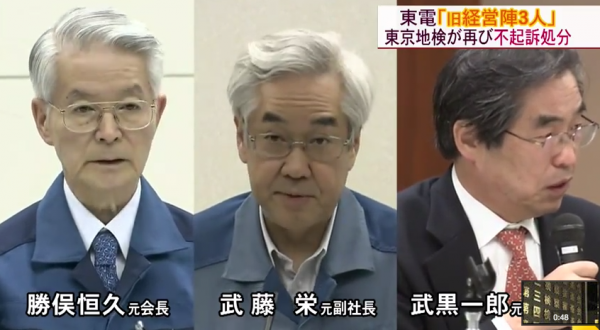
東京電力の福島第一原子力発電所で事故が発生し、大量の放射性物質が世界中にばら撒かれ続けています。危険なのはみんな知っているので、なるべく遠くに逃げたいと思うのが自然でしょう。上写真の東京電力関係者も福島県には近寄らないでしょう。
チェルノブイリ事故の基準では強制退去させられるような場所にもかかわらず、日本政府は一部の福島県住民に対して帰還の許可を与えました。しかし、許可を与えた官僚・政治家達は福島県から離れたところに住みたいはずです。私だって同じ気持ちです。
福島県双葉郡富岡町は今なお立入禁止の警戒区域に指定されていますが、あえてその場所にたった一人で住み続けている男性がいます。彼にそうさせているのは何か?どんな状況なのか?具体的には下記のビデオをご覧ください。
My Modern Metというサイトが、この男性のことを記事に書いています。リンクを以下に貼ります。( )内は私の日本語訳です。
スポンサーリンク
上記リンク英文記事の一部を以下に引用します。( )内は私の日本語訳です。参考にしてください。
「Thousands of citizens evacuated the area after the government established a 12.5-mile exclusion zone around the nuclear plant due to concerns over radiation exposure.」
(福島原発の周囲20km圏を政府が警戒区域に指定した後、何千人という住人が避難した。放射能に晒される危険がある為だ。)
「Fifth-generation farmer Naoto Matsumura was one of the many residents of Tomioka who left the town. He headed south with his parents, but after being turned away at his aunt’s door for fear of radiation contamination, and after finding refugee camps to be overly crowded with little resources to spare, Matsumura decided to return home to Tomioka to check on his family farm’s animals.」
(農家の五代目である松村直登氏も富岡町から避難した住人のうちの一人だ。彼は両親と共に南へ向かった。しかし、放射性物質まみれという理由で叔母の家には入れてもらえなかった。また、避難所はごった返しており、入る隙は無かった。松村氏は、自分の家で飼っている動物たちを確認するため富岡町の自宅に帰ることにした。)
「What he found was a desolate nuclear wasteland devoid of any signs of life—all except for the animals.」
(松村氏が見たものは、原発によって生命感を奪われた荒涼とした大地であった。・・・生きているのは動物たちだけだった。)
「As people had fled the town, many had left behind pets and livestock like dogs, cats, cows, ducks, a pony, and even ostriches.」
(避難する時、ペットや家畜を置き去りにした人が多い。犬・猫・牛・アヒル・仔馬、そしてダチョウなどだ。)
「Our dogs didn’t get fed for the first few days. When I did eventually feed them, the neighbors’ dogs started going crazy. I went over to check on them and found that they were all still tied up. Everyone in town left thinking they would be back home in a week or so, I guess. From then on, I fed all the cats and dogs every day. They couldn’t stand the wait, so they’d all gather around barking up a storm as soon as they heard my truck. Everywhere I went there was always barking. Like, ‘we’re thirsty’ or, ‘we don’t have any food.’ So I just kept making the rounds.”」
(私の飼っている犬たちは事故が起きてから2〜3日は何も食べていなかった。私が彼らに餌を与えた時、近所の犬たちが狂ったように吠え出した。見に行くと鎖に繋がれたままだった。町のみんなは避難する時、一週間かそこらで帰れると考えていたと思う。それからというもの私は毎日、全ての犬と猫に餌を与えてきた。私のトラックが着くと、待ちきれずにワンワン吠えながら集まって来た。私が行くところは常に泣き声の嵐になった。喉が渇いたよ〜!、何も食べてないんだよ〜!、と言わんばかりだった。だから私はあちこちを巡回し続けたんだ。)
「His food comes mostly in cans imported from outside the exclusion zone, and he relies on donations to support himself and the animals.」
(食事のほとんどが、警戒区域の外から缶に入った状態で運ばれてくる。松村氏と動物たちにとっては寄付が頼りだ。)
「In the meantime, all he can do is his best to keep his community alive as the last remaining citizen in the town, in spite of Japanese officials’ insistence that he evacuate the area.」
(とりあえず、ただ一人の住民として彼が出来ることは、生命の息吹を絶やさないように精一杯頑張ることだ。日本政府の役人は避難するように言っているが・・・。)
「We have all been abandoned by the government」「So the animals and I are staying here.」
(我々は皆、政府に見捨てられたんだ。だから私は動物たちと一緒にここに居るんだよ。)
以上